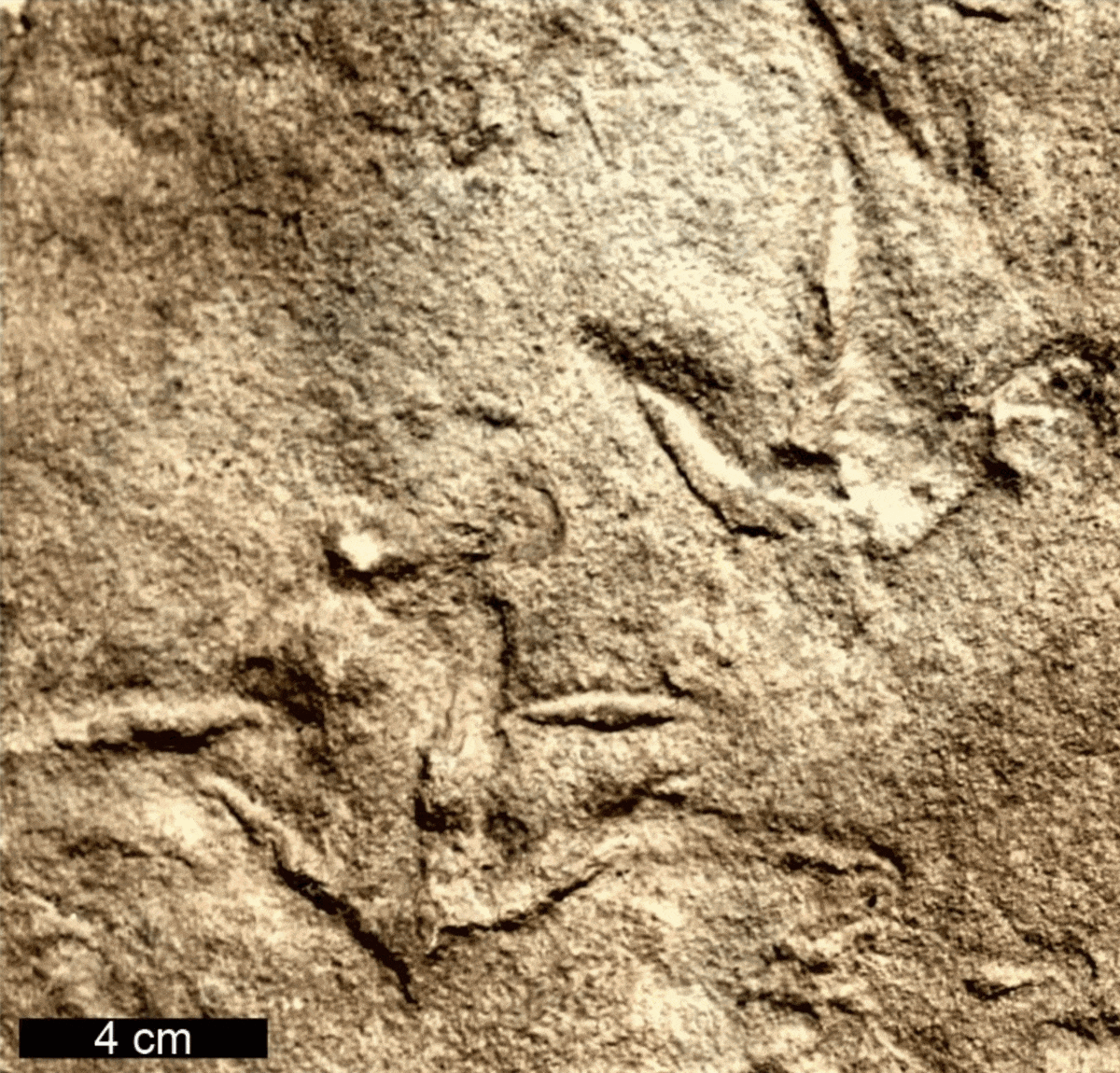Birds
Wild Kiwis Born Near New Zealand's Capital for the First Time in More Than 150 Years
Conservationists discovered two brown kiwi chicks one year after the birds were reintroduced in a Wellington suburb
South American Bird Makes Rare Appearance in Texas, Thousands of Miles From Home
Birders are driving hours to Corpus Christi for a chance to spot the cattle tyrant, which has never been observed in the United States before
Mysterious Creatures With Bird-Like Feet Made These Tracks Long Before Birds Evolved
The footprints pre-date the earliest known fossils of avian ancestors by roughly 60 million years, per a new study
Chinstrap Penguins Sleep Over 10,000 Times a Day—for Just Four Seconds at a Time
The amazing microsleep strategy may be an adaptation to group living and lurking predators in a harsh Antarctic environment
African Penguins Tell Each Other Apart by Their Polka Dot Patterns
New research suggests the birds may find their mates in crowded colonies by looking at their chest plumage
Meet Ferrisburgh, a Rescued Kestrel Who Started Painting After a Wing Injury
The Vermont raptor can no longer fly, but he is helping educators teach the public about his species through art
These Brainy Falcons Are Smarter Than You Might Think
Striated caracaras solved up to eight puzzle box problems in a new study, suggesting they are cognitively complex, like crows and parrots
One Reason Migrating Birds Get Lost Is Out of This World
Solar energy can alter the Earth’s magnetic field and likely lead the animals astray
Puking Bird Wins New Zealand's Bird of the Century Contest After John Oliver Campaign
The comedian launched an “alarmingly aggressive” global effort on behalf of the pūteketeke to shore up its victory in the annual popularity competition
Australia's Oldest Known Bird Tracks Are 120 Million Years Old
In that age, the continent was attached to Antarctica, but migrating animals still traveled to the polar region for sustenance
Watch How Hummingbirds Fly Through Narrow Spaces
Slow-motion video revealed the birds take two different approaches: flying sideways or pinning their wings back and darting like a bullet
How Kingfishers Dive Head-First Into Water Without Getting Concussions
Thanks to a new genetic analysis of 30 kingfisher species, researchers are one step closer to understanding the birds' dramatic hunting style
Cher Ami, the Iconic World War I Carrier Pigeon, Makes His Debut at Carnegie Hall
A treasured Smithsonian artifact is reputed to be the heroic savior of the embattled “Lost Battalion” on the Western Front
Why Dozens of North American Birds Will Soon Get New Names
In a bid to make birding more inclusive, the American Ornithological Society will give new monikers to several species named after people
After Getting Stuck in a Sculpture at the National Gallery of Art, This Barred Owl Is Now Flying Free
The bird spent some time recuperating at two rehabilitation facilities and is now back in the wild
Roosters May Recognize Their Reflections in Mirrors, Study Suggests
The findings demonstrate self-recognition could be more common among animals than previously thought
Huge Cicada Broods Have Ripple Effects on Birds, Caterpillars and Trees
When Brood X emerged in 2021, scientists measured how the influx of billions of insects affected the ecosystem near Washington, D.C.
Artist John Akomfrah Is Having a Moment
The works of the recently knighted filmmaker address contemporary issues in two different Smithsonian museums
Can Every Living Thing Be Traced to a Single Cell? And More Questions From Our Readers
You’ve got questions. We’ve got experts
New Synthetic Horseshoe Crab Blood Could Mean Pharma Won't Bleed the Species Dry
The “living fossils” have been vital for testing intravenous drugs, but a few large pharmaceutical companies are using a lab-made compound instead
Page 6 of 48
:focal(400x349:401x350)/https://tf-cmsv2-smithsonianmag-media.s3.amazonaws.com/filer_public/c2/56/c2562941-79c8-42ae-9ac4-70e125dc269f/406117628_728005142697398_6241952341236354651_n_1.jpeg)
:focal(1061x707:1062x708)/https://tf-cmsv2-smithsonianmag-media.s3.amazonaws.com/filer_public/56/23/56231550-f9b2-4a92-b49b-0ba32b8fb1d2/gettyimages-503879935.jpg)

:focal(800x602:801x603)/https://tf-cmsv2-smithsonianmag-media.s3.amazonaws.com/filer_public/f9/b1/f9b1b164-0337-4bd0-8701-5dd785b9841f/gettyimages-1211681955_web.jpg)
:focal(790x526:791x527)/https://tf-cmsv2-smithsonianmag-media.s3.amazonaws.com/filer_public/6e/15/6e158b03-356d-4290-ad69-b61c7226e72f/1-s20-s0003347223002579-gr1_lrg.jpg)
:focal(828x1104:829x1105)/https://tf-cmsv2-smithsonianmag-media.s3.amazonaws.com/filer_public/33/44/33449b35-e36d-4d4c-aa06-bda6839265f7/ferrisburgh__painting_-_credit_anna_morris.jpg)
:focal(1044x566:1045x567)/https://tf-cmsv2-smithsonianmag-media.s3.amazonaws.com/filer_public/d2/d5/d2d57069-2876-4aa2-b895-cd348c2de635/50788460676_17d17ebed1_k.jpg)
:focal(800x602:801x603)/https://tf-cmsv2-smithsonianmag-media.s3.amazonaws.com/filer_public/f7/3a/f73ad13d-33a3-4d5a-88ff-8b3af7eac11d/red_brested_flycatcher_by_david_raju_cropped_web.jpg)
:focal(1024x653:1025x654)/https://tf-cmsv2-smithsonianmag-media.s3.amazonaws.com/filer_public/84/4f/844f48a7-b3f9-42fc-a040-2d8c6de2fe1f/23475117089_1e9175012b_k.jpg)
:focal(754x567:755x568)/https://tf-cmsv2-smithsonianmag-media.s3.amazonaws.com/filer_public/b3/f0/b3f07d9c-0644-48a2-8c37-c1f24a2ddb9c/ff-1-3_web.jpg)
:focal(867x562:868x563)/https://tf-cmsv2-smithsonianmag-media.s3.amazonaws.com/filer_public/28/04/28047578-43cf-4989-89ab-2219f0211797/hummingbird_2000px.jpg)
:focal(1640x1093:1641x1094)/https://tf-cmsv2-smithsonianmag-media.s3.amazonaws.com/filer_public/20/c7/20c74bbf-c59b-45dc-8899-fbda43b70d48/gettyimages-1068204378.jpg)
:focal(1500x1129:1501x1130)/https://tf-cmsv2-smithsonianmag-media.s3.amazonaws.com/filer_public/39/08/39081783-6aba-425b-ba3a-f1299dbe10dc/resizejn2023-01323.jpg)
:focal(928x539:929x540)/https://tf-cmsv2-smithsonianmag-media.s3.amazonaws.com/filer_public/23/f9/23f9784b-686a-4373-913e-60f61f86e745/48702172711_3e03d77d20_k.jpg)
:focal(1014x686:1015x687)/https://tf-cmsv2-smithsonianmag-media.s3.amazonaws.com/filer_public/38/4b/384bb372-a4f2-48bb-a7f8-32d7fd112f7d/8164885124_a4592086cb_k.jpg)
:focal(2953x2250:2954x2251)/https://tf-cmsv2-smithsonianmag-media.s3.amazonaws.com/filer_public/29/ca/29ca4777-fca0-4f77-adb6-1429f9ce037b/gettyimages-1228429912.jpg)
:focal(2279x1519:2280x1520)/https://tf-cmsv2-smithsonianmag-media.s3.amazonaws.com/filer_public/c7/5e/c75e1bf0-b0d5-4fb4-ac2d-b6a435551891/gettyimages-1321571330.jpg)
:focal(884x593:885x594)/https://tf-cmsv2-smithsonianmag-media.s3.amazonaws.com/filer_public/c0/55/c0552d9b-270b-4806-b0be-dd105e59b8a6/akomfrah_portrait_for_press_release.jpeg)
:focal(446x335:447x336)/https://tf-cmsv2-smithsonianmag-media.s3.amazonaws.com/filer_public/9f/5e/9f5e4a1e-8730-4c7a-98b5-e1622684253a/ask.jpg)
:focal(512x349:513x350)/https://tf-cmsv2-smithsonianmag-media.s3.amazonaws.com/filer_public/48/11/4811c219-7a18-485d-8d48-232104b8460d/gettyimages-1241981966.jpg)